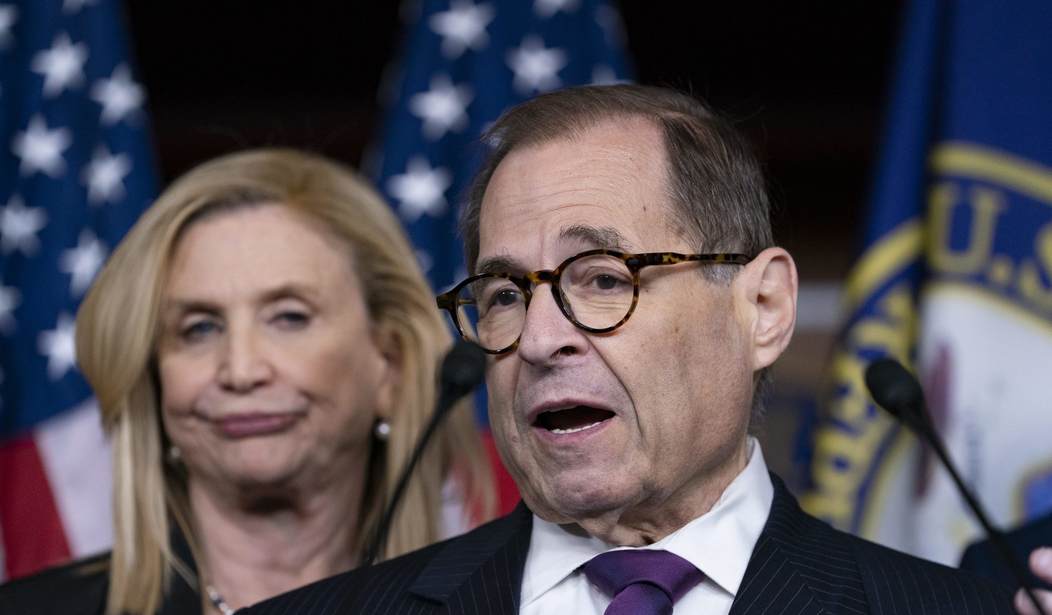On Friday night, constitutional lawyer Jonathan Turley wrote that Democrats have to give up their ridiculous argument that Trump must be impeached because he would go to court to challenge a congressional subpoena. Turley has called this the Democrats’ “abuse of power” because presidents routinely claim executive privilege and go to court to determine what documents they have to hand over.
Yet earlier on Friday, Rep. Jerrold Nadler (D-N.Y.) went so far as to brand Trump a “dictator” — because he refused to hand over documents to Congress immediately. Oh no! The president had the temerity to flout a congressional subpoena, preferring to litigate the matter in court. This must be an abuse of power, right? It’s not like any previous administration referred to executive privilege to refuse to hand over documents to Congress, right? Certainly, Barack Obama would never, ever do that.
It’s not like there was an ATF gun-walking scandal that got a law enforcement officer killed, and when Congress requested documents, an attorney general — like, I don’t know, Eric Holder? — refused to hand them over. That would never happen, right? I mean, it’s not like Eric Holder was held in contempt of Congress over this or anything. Democrats like Adam Schiff, Nancy Pelosi, and Jerry Nadler would never defend such a thing, would they?
But I digress. Jerry Nadler, He Who Exposes Dictators, will not be bothered by such trifling details from recent history. His powerful remarks exposed Trump as a dictator — a horrific malevolent force railroading Congress like no one before him.
“President Trump is an outlier. He’s the first and only president ever to declare himself unaccountable and to ignore subpoenas backed by the Constitution’s impeachment power. If he is not removed from office, if he is permitted to defy the Congress entirely, categorically, to say that subpoenas from Congress in an impeachment inquiry are nonsense, then we will have lost — the House will have lost, the Senate certainly will have lost — all power to hold any president accountable,” Nadler proclaimed.
“This is a determination by President Trump that he wants the be all-powerful, he does not have to respect the Congress, and he does not have to respect the representatives of the people and only his will goes,” the Democrat’s historic speech continued. “He is a dictator!”
House Impeachment Manager Jerry Nadler to the 63 million Americans who voted for President @realDonaldTrump:
"He is a dictator. He must be removed from office." pic.twitter.com/O8a36m6GOu
— Rep Andy Biggs (@RepAndyBiggsAZ) January 24, 2020
Of course, this isn’t remotely true. Perhaps Trump’s rhetoric on flouting subpoenas went further than Bill Clinton’s or Richard Nixon’s, but as Turley noted on Friday, both the former presidents who faced impeachment inquiries challenged congressional subpoenas in court.
“When Congress demands documents, presidents often have objections based on the inherent immunities or privileges of their office. Both Richard M. Nixon and Bill Clinton were able not only to seek judicial review but also to take their appeals all the way to the Supreme Court before facing impeachment. Nixon soon resigned after losing that case,” Turley noted.
So, by Nadler’s reasoning, William Jefferson Clinton was a “dictator.” Perhaps even Barack Obama was a “dictator” because his “wingman” Eric Holder flouted congressional subpoenas — an assertion of executive privilege that Nadler himself backed at the time! Is Jerry Nadler an enabler of dictators?
With impressive clarity, the constitutional law professor cut right to the heart of what is really going on in this battle over executive privilege. The House impeachment managers “lost this case before it began — not because of the Republican majority but because of the House managers’ own historic blunder in rushing the impeachment forward on an incomplete record,” he wrote in The Washington Post.
“The House destroyed any chance for an obstruction article when it made an impeachment by Christmas its overriding priority. The short period set by the House did not allow the White House to challenge a subpoena and effectively made the seeking of judicial review a ‘high crime and misdemeanor.'”
Nadler is not complaining that Trump has somehow placed himself beyond the ability to be impeached. Trump has never suggested that if the House voted to impeach him and the Senate voted to convict and remove him, he would remain in office. That would make him something akin to a dictator and justify Nadler’s vituperations.
No, Trump was merely asserting the kind of executive privilege the Obama administration asserted in the Fast & Furious scandal. The same kind of executive privilege that both Nixon and Clinton asserted in previous impeachment inquiries — and which the Supreme Court found important enough to debate (this is an extremely high legal bar).
Turley has warned Democrats that they may have to scrap their second article of impeachment — obstruction of Congress — due to the pre-Christmas rush, just to be able to convince the Senate to call witnesses to consider the other article of impeachment — abuse of power. It seems unlikely managers like Nadler will consider this option when they have already dubbed Trump a “dictator” for his threat to use the routine argument of executive privilege.
Tyler O’Neil is the author of Making Hate Pay: The Corruption of the Southern Poverty Law Center. Follow him on Twitter at @Tyler2ONeil.









Join the conversation as a VIP Member